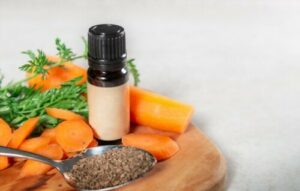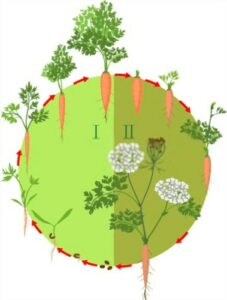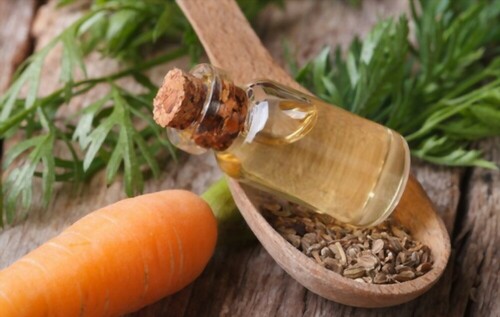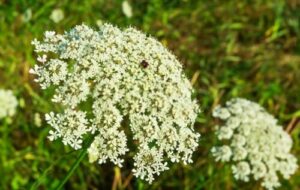 CARROT SEED OIL PRODUCT DESCRIPTION
CARROT SEED OIL PRODUCT DESCRIPTION
Botanical Name: Daucus carota subsp. sativus L.
Family Name: Apiaceae
The use of carrot seed oil dates back to the Ancient Egyptian and Greek civilisations, and is used in traditional Chinese medicine as a bath or massage oil to address muscle pain, as well as being taken internally for the relief of intestinal ailments including dysentery and worms. The wild carrot, from which the domesticated carrot originated, is indigenous to Europe, North Africa, and Western Asia, and was transported to America as a medicinal plant. The scientific name for carrot is Daucus carota var. sativus which is a combination of both Latin and Greek – daucus is Latin for parsnip or carrot (both belonging to the flowering plant family Apiaceae), and carota is Greek for carrot. Sativus means cultivated in Latin, and differentiates it from the wild variety.
 Carrots contain more than 32,000 genes (that’s approximately 20% more than humans), of which two recessive ones are responsible for a build-up of colourful carotenoids, such as alpha- and beta-carotene. Incidentally, carotenoids were first discovered in carrots. Carrots were not originally a single root, but the Persians practised selective breeding to produce bigger and better roots until the single root emerged. The colour also mutated, changing from white to purple and yellow, approximately 1100 years ago, and after further selective breeding of plants containing a large amount of beta carotene, changed to the common orange colour we are more familiar with, around 600 years ago. Although not so common, purple, yellow, black and more are still available today.
Carrots contain more than 32,000 genes (that’s approximately 20% more than humans), of which two recessive ones are responsible for a build-up of colourful carotenoids, such as alpha- and beta-carotene. Incidentally, carotenoids were first discovered in carrots. Carrots were not originally a single root, but the Persians practised selective breeding to produce bigger and better roots until the single root emerged. The colour also mutated, changing from white to purple and yellow, approximately 1100 years ago, and after further selective breeding of plants containing a large amount of beta carotene, changed to the common orange colour we are more familiar with, around 600 years ago. Although not so common, purple, yellow, black and more are still available today.
Carrot seed oil is cold pressed from the carrot seeds, and should not be confused with carrot oil (infusing carrot flesh into an oil,) or carrot essential oil (obtained through steam distillation). It is invaluable for skincare and is widely used in cosmetics for promoting skin repair and rejuvenation, and also helps to reduce photosensitivity. Additionally, carrot seed oil has many other therapeutic uses, and its benefits for eye health are inimitable. So what else is cold-pressed carrot seed oil good for, and how do you use it?
HOW TO USE CARROT SEED OIL
The therapeutic properties of natural carrot seed oil can be administered by way of topical application, as a massage, or taken orally (or as a food dressing/flavouring).
CARROT SEED OIL USES AND BENEFITS
Carrot Seed Oil Benefits Taken Orally:

- Taken daily, carrot seed oil helps to remove bodily toxins including urea and uric acid, and remove chemical residues which enter the body through the body, as well as eliminating environmental toxins such as pesticides. As both a diuretic and hepatic, it cleanses and promotes the health of the liver, kidneys and gallbladder, neutralises excess bile from the liver, remedies infections related to jaundice, reduces the discomfort of kidney stones, prevents harmful bacteria which can contaminate the excretory system, addresses fluid retention, and ensures good functioning of the urinary tract. By detoxifying the blood, muscles and tissues, and reducing uric acid, it is an effective remedy for arthritis, gout and rheumatism.
- Carrot seed oil promotes the efficient and correct functioning of the digestive system, disinfects the intestines, remedies diarrhea and flatulence, and regulates bowel function. It also reduces the occurrence of gastric ulcers, and relieves existing ones.
- It’s not just an old-wives tale, carrots really can help you see in the dark! To be clear, they actually enhance twilight/night vision and light perception. Carrot seed oil is extremely rich in beta carotene and lutein which help protect against damage from free radicals. It helps restore and protect eye health and prevents age-related macular degeneration, protects against cataracts, strengthens the mucous membranes of the eyes, and improves and helps to regulate intraocular pressure. Carrot seed oil improves visual acuity which is important to anyone spending extended time using a computer, laptop or smart phone, and helps the eyes better adapt to various lighting, as well as relieving eye fatigue.
- Being extremely high in antioxidants, carrot seed oil protects the body from cell damage and chronic diseases. It also boosts the immune system to offer protection against illness.
- Carrot seed oil has been indicated as having anti-carcinogenic properties, and to be beneficial in the treatment of some cancers including throat, stomach, prostate and kidneys.
- This restorative oil helps to restore strength after infectious diseases, particularly for a lack of vitamin A.
- By improving the condition of the mucous membranes of the respiratory tract, carrot seed oil increases the body’s resistance to respiratory diseases such as influenza and bronchitis.
- Carrot seed oil is a stimulant and stimulates the brain and nerve function, helping to refresh the body, increase alertness, and diminish anxiety, stress and fatigue. It further stimulates the circulation and metabolic function, prompting the secretion of hormones, enzymes, bile and gastric juices, and encouraging peristaltic movement to aid digestion.
- As a natural emmenagogue, carrot seed oil can help to regulate the menstrual cycle, bring pain relief, and lessen the effects of premenstrual tension.
- Carrot seed oil is a natural vermifuge and can kill parasitic worms in the intestines.
Carrot Seed Oil Topical Application Benefits:

Carrot seed oil benefits for the skin:
- Known as Nature’s tan accelerator, and subsequently a key component in many sun tan oils and tan accelerators, carrot seed oil promotes and accelerates tanning, stimulates the production of melanin, and protects against UV exposure.
- With strong antimicrobial and astringent properties, carrot seed oil helps to achieve a glowing, even complexion. It cleanses the pores, removes impurities, tightens and tones the skin, strengthens the skin tissue, reduces redness, freckles and hyperpigmentation, and relieves rashes and inflammatory skin disorders such as acne, vitiligo, boils, dermatitis, eczema, psoriasis, sunburn and sores, to promote a clearer, brighter, evenly toned complexion.
- Carrot seed oil nourishes, tightens and regenerates the skin, improves skin tone and elasticity, boosts collagen production and stimulates cell regeneration to diminish saggy skin and improve the appearance of fine lines and wrinkles, thus rejuvenating ageing skin.
- By stimulating the sebaceous glands, carrot seed oil balances sebum control to ensure the correct hydration for both oily and dry skin.
- Carrot seed oil acts as an antiseptic to prevent wounds and burns becoming infected, and supports wound healing.
- Natural carrot seed oil has antifungal properties for the elimination of fungal infections, and is known to prohibit the candida species. Application of this oil to infected areas can relieve athlete’s foot, plus nail and skin fungal infections.
Carrot seed oil benefits for the hair and scalp:
- Applied to the scalp, carrot seed oil deeply conditions, soothes irritation and itching, and combats bacterial and fungal infections. It can remedy conditions such as dandruff and seborrheic dermatitis.
- Carrot seed oil strengthens the roots of the hair to prevent loss, stimulates the hair’s growth, and restores the hair’s health, strength and lustre, and eliminates dullness.
Carrot Seed Oil Massage Benefits:

- Use carrot seed oil as a face massage to boost dull and lacklustre skin, and leave it looking radiant and glowing.
- With its strong anti-inflammatory action, carrot seed oil can relieve aching or tense muscles and reduce joint inflammation.
- When used as a full body massage, carrot seed oil helps to detoxify and tone the entire body, assists circulation, and boosts the respiratory system.
PLANT DESCRIPTION
 The carrot is a domesticated version of the wild carrot, and is a root vegetable. Initially, like their close relatives parsley, cilantro, coriander, fennel, anise, dill and cumin, carrots were originally grown for their aromatic leaves and seeds. Carrot seeds dating back to 2000-3000 BC have been found in Switzerland and Germany.
The carrot is a domesticated version of the wild carrot, and is a root vegetable. Initially, like their close relatives parsley, cilantro, coriander, fennel, anise, dill and cumin, carrots were originally grown for their aromatic leaves and seeds. Carrot seeds dating back to 2000-3000 BC have been found in Switzerland and Germany.
The carrot plant is biennial and part of the umbellifer family, apiaceae. It grows a rosette of leaves and the taproot grows and enlarges as the leaves produce a large amount of sugars which are stored in the taproot to provide energy to enable the plant to flower in the second year. The taproot is long and conical in shape and most typically orange, although other shapes including almost spherical cultivars, and also different colours, are available.
The stem of the plant produces umbels (a cluster of flowers), which consists of smaller umbellets. The first umbel grows at the end of the stem, and smaller umbels grow from the main branches. The primary umbel can contain up to 50 umbellets, and these in turn can contain up to 50 flowers which are small and white, although they may have a light green or yellow tint. The lowers bloom for approximately 7-10 days.
After fertilisation, and as the seed develops, the outer umbellets change their shape and position to resemble a bird’s nest, in which a dry fruit develops containing 2 mericarps (the true seeds). The mericarps are easily separated when dried, but early harvesting can cause them to shatter and thus destroy the seed. These seeds contain the oil ducts that house the precious oil, which is cold pressed to retain its integrity.
CHEMISTRY OF CARROT SEED OIL
Carrot seed oil contains fatty acids (mostly oleic acid, linoleic acid plus stearic acid, palmitic acid, linolenic acid), sterols (beta-carotene, campesterol, stigmasterol, beta sitosterol), vitamin A, C, E, potassium, and other antioxidants (contains more than 600 identified carotenoids).
SOURCING CARROT SEED OIL
When searching for a natural oil or essential oil, it is always best to look for an oil which has been manufactured from start to finish with one souce, thus ensuring its integrity. All natural oils should be collaborated with certification.
If you would like to add carrot seed oil to your oil collection, look no further than Nefertiti for natural oils and herbs: https://nefertiti-eg.com/shop/natural-oils/carrot-seed-oil-1/
Unlike other “carrot seed oils” which consist of macerated carrot seeds in a vegetable oil, Nefertiti’s carrot seed oil is a 100% authentic pure cold pressed oil.
Nefertiti uses best practises, natural fertilisers only, and their unique experience, to produce the best plants for their exclusive use, from their own farm in Al Fayoum, one of the richest agricultural regions in Egypt. The oils are extracted in their own factory, using the environmentally friendly fashion of modern cold press technology or steam distillation, using no other solvents, and ensuring a constant supply of optimum high quality oils.
All natural oils produced using the cold press method are done under the control of the Egyptian State and the Egyptian Ministry of Health. In recognition of their never-ending strive for quality, all of the products are certified. Certifications obtained include: COA certificates and ISO awards in Quality Management System, Environmental management system, Occupational Health & Safety, Food Safety Management System, to name just a few.


